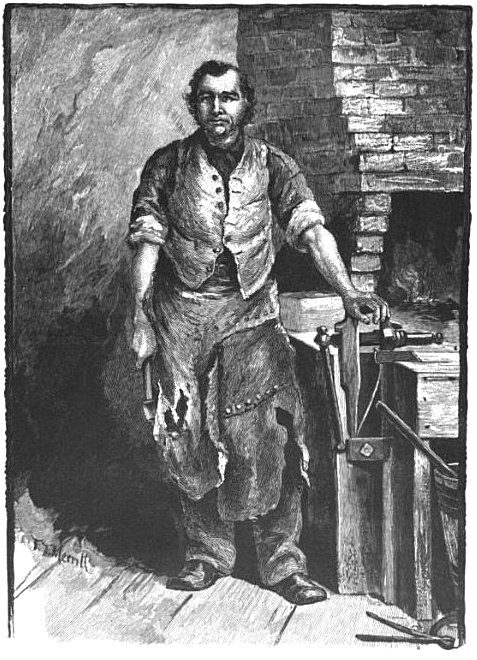 God bless the business leader who ends up wealthy, while benefiting our economy. God bless the village smithy who does his job joyfully. Both can be happy, both are people of accomplishment.
God bless the business leader who ends up wealthy, while benefiting our economy. God bless the village smithy who does his job joyfully. Both can be happy, both are people of accomplishment.
There is a question on my social media account that points out that a famous teen from a famous family is (almost) a billionaire.
“What have you done?” runs the question in the posts. I haven’t made much money and am not famous, but then those were never goals.
Should they be?
I once engaged in a exchange with a writer of pop-theology whose response to me was to laugh at my book sales. Safe to say, writing on Plato and philosophy is not profitable, but I (and my few thousand readers) have learned something I hope.
I do not want to write books like he writes and I am only assuming he has sold many books. Why? Selling would be great, but it did not occur to me to measure the worth of a book by copies sold. Bill Clinton just put his name on a best selling novel, but the book is still no good.
A real author writes a book, the hack churns out product.
Few want a doctor who does medicine for the money. To care for a person created in the image of God and to have money as a motivation is wrong and sad. What does a doctor miss when he sees a paycheck instead of patients? A pastor is called to serve and not be served, as is a politician or even a king in a Christian land.
Making Money
People need to be able to meet their needs and a free market will tend to reward hard, good work. Christian nations have regulated a pure free market since values can be skewed or harm done in the short term, but nobody minds people doing well by doing good.
Some Christians go further and embrace socialism in order to make the system even better. Bright people will make sure each worker gets what she or he deserves and no more. Most Christians have rejected socialism after centuries of experience with the system, because giving the government the power to decide what is fair pay turns out badly. Less overall services and wealth are produced and most people are worse off.
This is why Western Christian arguments about economics and government tend to be about how much liberty the market should have and how much the government, Church, and society should balance out the results to help those who are “losers.’
After all, money cannot buy happiness, but up to a point, having money helps a happy person thrive. Only a very great saint can flourish on a starvation diet.
Socrates and Money Making
Philosophers are often accused of being bad at money making and this is probably true if money making is the thing to do. If money making is a thing you hope to do while trying to become a better human, then philosophy might be a good way to go. I don’t know anyone who studies philosophy to make money, so failure at that task is not too serious. God bless the person who works a day job while reading carefully and considering ideas.
Philosophy is not special.The doctor heals us, teacher educates, the village smithy made our horses flourish and made implements for the town. Each job can lead to flourishing if the right person has the skill and grasps the purpose. When Longfellow praised the village smith, he had it right:
Toiling,–rejoicing,–sorrowing,
Onward through life he goes;
Each morning sees some task begin,
Each evening sees it close
Something attempted, something done,
Has earned a night’s repose.Thanks, thanks to thee, my worthy friend,
For the lesson thou hast taught!
Thus at the flaming forge of life
Our fortunes must be wrought;
Thus on its sounding anvil shaped
Each burning deed and thought.
Growing up in West Virginia, I knew many women and men who were lovers of wisdom and whose toil, done for love and not money, had taught them goodness, truth, and beauty. Many had two jobs, one that paid them, and another, like working as a Sunday School teacher that was their main role and what they were remembered for when they died. They had enough and I would rather be their grandchild than the famous teen.
Like most deep truth, many of God’s children have found this rule: work for love, earn money. In fact, some of the richest and most innovative people who have ever lived, men like JC Penney (there used to be a department store!) and Westinghouse did very, very well financially by doing great good for our nation.
The high pagan philosophers saw this as well, especially Plato. In Republic, Socrates has been pinned in an argument with the sophist (and friend of tyrants) Thrasymachus. Socrates wishes to heal Thrasymachus and learn the truth, so he persuades Thrasymachus to stay.
Thrasymachus, like the many college administrators, educates for money. He is better than we are, he drives no students into debt, but he does work for cash. He only agreed to start the conversation when he was promised pay. At this point, he could leave, but Socrates has intruiged him by asking how all of them might best live the good life.
Thrasymachus has argued that shepherds don’t care about sheep: just fleece and meat. They are in it for the money and not for the sheep, just as human rulers exploit those they rule. Socrates makes a good point; many professions make money, but the object of the profession itself is not money making. What makes medicine different from teaching? It is not that doctors often get paid, since teachers do too! In fact, a man might be a doctor without earning money, as the saints of the Church called the “holy unmercenaries” demonstrate. They practiced medicine for free and far from making them bad doctors, we honor them as doctors.
I have known shepherds. They did in the end sheer their sheep, an act that did not harm them, but none I knew had become shepherds for the cash. All could have made more money doing other things, but they loved tending sheep! There are people who invest in sheep (however unwisely), but these people need not even be shepherds!
All the shepherds I have met viewed their lives as shepherds as tending sheep.
Socrates sums up;
So wages benefit the wage earner’s account and do not derive directly from his art. In his professional role the doctor nurtures health; in his wage-earning role he collects his pay. The same with the architect who builds a house, and the same with all the others. Each art performs the functions proper to it and benefits its proper objects.
This is very useful. Money making (in certain societies) is a skill that is different than other skills. God bless schools that learn the difference, never put down any human skill done nobly, but do not confuse money making with other humane arts. If a student loves two jobs and can help people with both, then the fact that the market will pay him to do one is a good reason he might prefer that job, but it can never be final.
There are many goods!
———————————————-
*I begin an informal summer reading of Republic using Scott/Sterling (a new translation for me). Part 1. Part 2. Part 3. Part 4. Part 5. Part 6. Part 7. Part 8. Part 9. Part 10. Part 11. Part 12. Part 13. Part 14. Part 15. Part 16. Part 17. Part 18. Part 19. Part 20. Part 21. Part 22. Part 23. Part 24. Part 25. Part 26. Part 27. Part 28. Part 29. Part 30. Part 31. Part 32. Part 33. Part 34. Part 35. Part 36. Part 37. Part 38. Part 39. Part 40.












